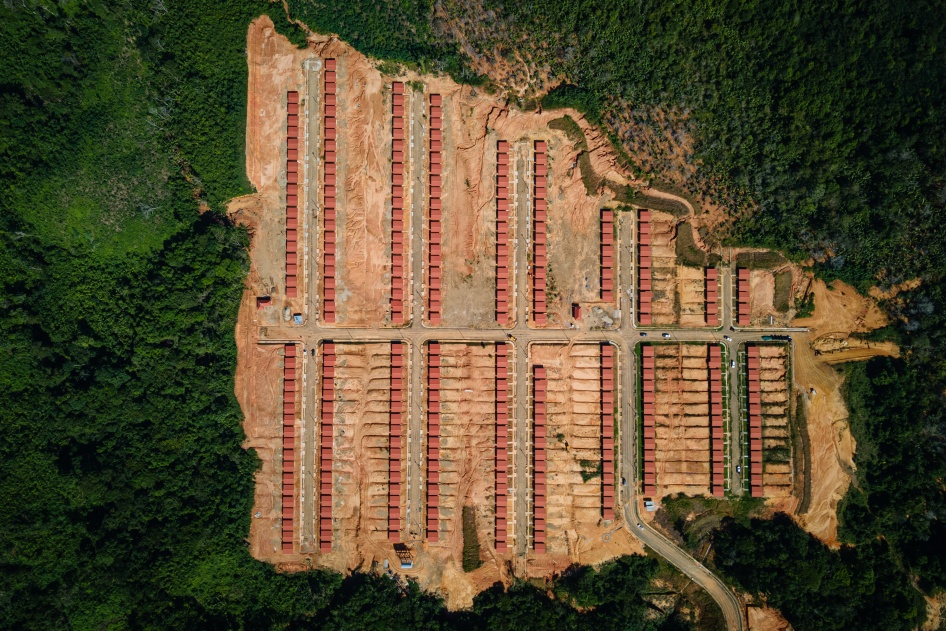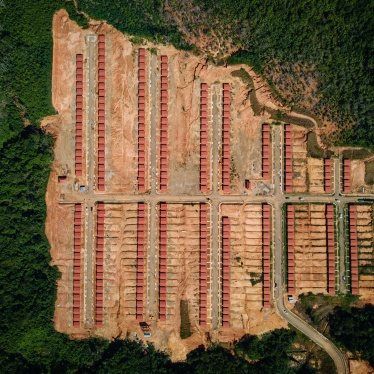- The Panamanian government has not provided needed facilities for the Guna Indigenous community to relocate from their flood-prone island to a safer site.
- If immediate action is not taken, this case could be an example of what can go wrong when community needs are not front and center in climate-related relocations.
- Panama needs rights-respecting, community-led relocation policy as climate change accelerates.
(New York) – The Panamanian government has not yet provided essential services for the Guna Indigenous people of Gardi Sugdub, who plan to relocate because of rising sea levels on their overcrowded island, Human Rights Watch said today. Urgent government action is needed to address these gaps before the rapidly approaching end-of-February target date.
Gardi Sugdub is an island the size of five soccer fields with 1,300 inhabitants off Panama’s northern coast in the Guna Yala autonomous region. The community has been requesting government support for relocation since 2010. The government has made significant progress since Human Rights Watch reported about the case in July 2023. The relocation site on the mainland now has the planned 300 houses, cultural gathering centers built in the community’s traditional style, and a nearby school with sports facilities. But the Panamanian government has yet to make adequate water, sanitation, and health care available at the relocation site.
“The Panamanian government risks stumbling at the last hurdle,” said Erica Bower, climate displacement researcher at Human Rights Watch. “If water, sanitation, and health care gaps are not addressed, this case may become a key example of what can go wrong when community needs are not front and center in climate-related relocations.”
The new site, named Isper Yala (Land of the Loquat Tree) to reflect the Guna language and values, is located higher on the mainland, a 2.5-kilometer walk to the coast followed by a 2.4-kilometer boat ride away from the island. Construction began in 2019 and had been delayed repeatedly over the last five years.
Urgent government action is needed to ensure people’s rights to water, sanitation, and health care at the new site. Blas Lopez, a Guna community leader, told Human Rights Watch: “Officially, the keys will be handed over, but the problem is going to be water. We can’t live [there] without water.”
The planned relocation, which the community requested as a necessary step to avoid rising seas and overcrowding, is the first in Panama and among the most community-led examples globally. Most people do not want to leave their homes, and planned relocations are a measure of last resort. But “as climate risk intensifies, the need for planned relocations will increase,” said the Intergovernmental Panel on Climate Change (IPCC), the world’s leading authority on climate science, in their latest report.
As the effort to relocate Gardi Sugdub has shown, relocations can be complex, time-intensive, and fraught processes. An estimated 38 other communities in the Guna Yala region alone, as well as others across Panama, are already facing rising seas and mobilizing for relocation.
Without institutional arrangements, adequate funding, and a national policy framework informed by human rights principles, other communities may face similar challenges and delays, Human Rights Watch said. Panama should learn from this experience and draft a national policy to safeguard people’s rights in future climate-related, community-led planned relocations. The voices of Gardi Sugdub residents, whose insights and experiences are invaluable in learning what has and has not worked well, should be reflected in policy development.
A few days out from the supposed date of this relocation, a number of lessons have already emerged:
- Governments should protect communities’ collective right to self-determination throughout all stages of planned relocation processes.
- Community members who wish to stay behind should not be forgotten and need continued access to basic services and transportation between sites.
- Beyond houses and infrastructure, a relocation site should ensure rights to an adequate standard of living, sustainable livelihoods, and cultural identity.
- Relocation planning should include culturally appropriate homes, ceremonial halls, and cultural centers, among other efforts to ensure traditions are not lost.
- The international community should provide technical and financial support to governments and communities when needed.
Panama should look to Pacific Island countries that have already developed such policies, such as Fiji and the Solomon Islands.
“Panama, and every country with a coastline, must prepare for rising sea levels and figure out how to best support community-led relocation,” Bower said. “The case of Gardi Sugdub provides important lessons, starting with how essential it is to follow through on promises and develop rights-respecting national policies.”






